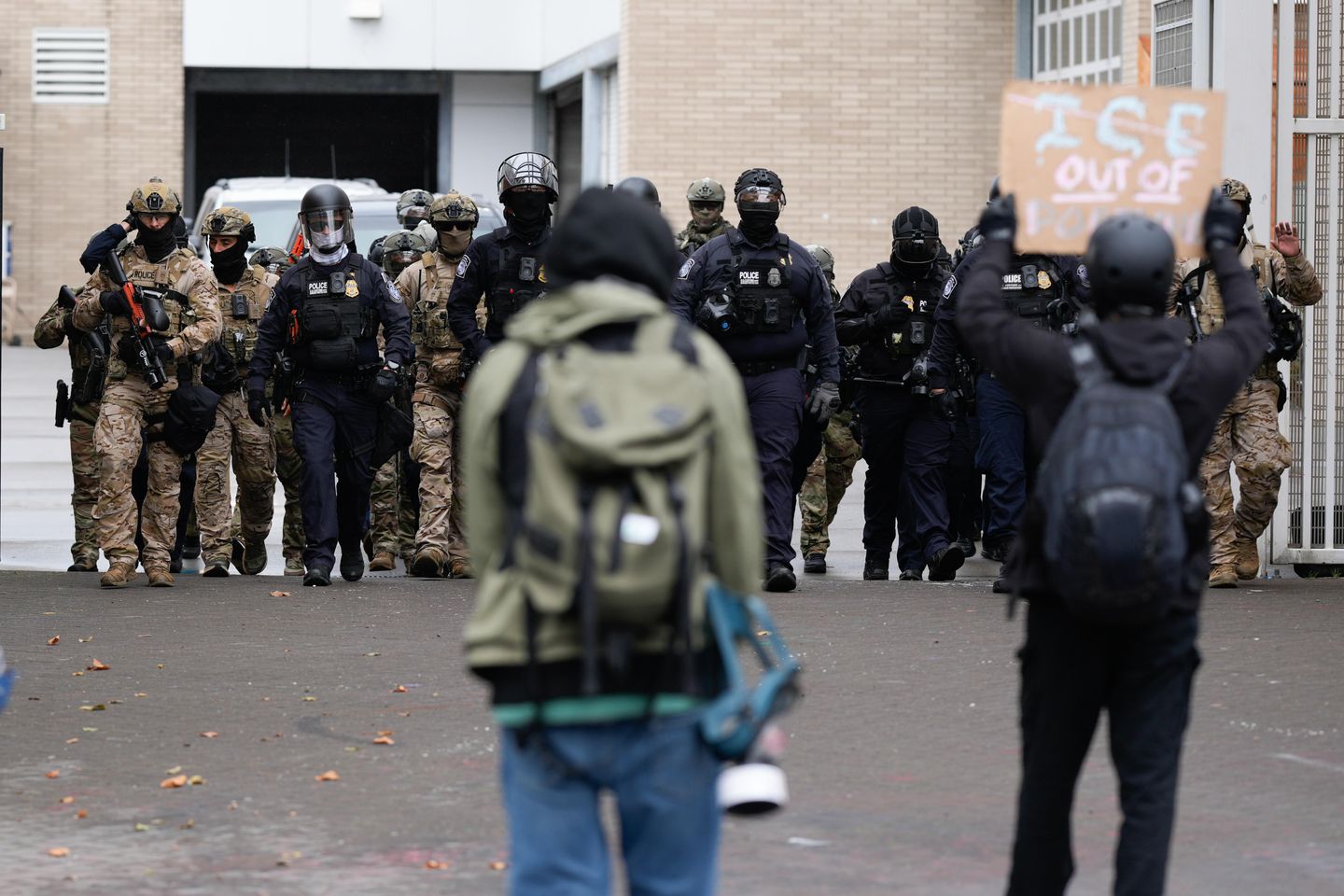
A federal appeals court Monday allowed President Trump to federalize and deploy National Guard troops to Oregon to help immigration officers carry out their duties, ruling that the law gives a president wide deference in those sorts of decisions.
The 2-1 ruling is a major legal win for Mr. Trump, marking the second time the 9th U.S. Circuit Court of Appeals has given the OK to a troop call-up. The previous one was in Los Angeles.
It also stands in contrast with a ruling by a district judge in Chicago blocking a troop deployment in Illinois, where U.S. Immigration and Customs Enforcement faces similar headwinds from protesters.
“After considering the record at this preliminary stage, we conclude that it is likely that the president lawfully exercised his statutory authority,” the majority said in an unsigned opinion. Both of the judges are Trump appointees.
They put on hold a lower court injunction that had blocked Mr. Trump from calling up and deploying Oregon National Guard troops.
Mr. Trump is still blockaded by a second injunction, though its legal authority is unclear. The Justice Department has said it figures the lower court would lift that injunction in light of the appeals court’s ruling.
Oregon immediately filed a request asking the full appeals court to step in and overrule the panel, and a member of the 9th Circuit has asked colleagues to intervene.
The court gave both sides until Wednesday night to file briefs on the request.
Mr. Trump said the troops were necessary to calm months of protests aimed at ICE and its arrest and deportation efforts. The Department of Homeland Security has had to call in agents and officers from other parts of the country to protect ICE facilities.
The president said that triggered the federal law allowing call-up because the “regular forces” were unable to execute the law.
Judge Susan Graber, a Clinton appointee, said she “strenuously” dissented to what she called “the illegal deployment of troops under false pretenses.”
She said Mr. Trump has oversold the events in Portland.
“It is hard to understand how a tiny protest causing no disruptions could possibly satisfy the standard that the president is unable to execute the laws,” she said.
Judge Graber said the Portland upheaval fell far short of the riots that prompted National Guard deployment in the past, including the riots in the wake of the Rev. Martin Luther King Jr.’s assassination in 1968 and the 1992 riots after the verdict in the trial of police officers accused of beating Rodney King.
Judge Ryan Nelson compared Mr. Trump’s call-up to the actions of George Washington and John Adams in the 1790s, when they called up the militia to put down the “Whiskey rebellion” and “Fries’s rebellion,” both in Pennsylvania.
Judge Nelson pointed out that Adams’ actions hurt him at the ballot box, helping Thomas Jefferson unseat him in the 1800 election.
“The political process was a powerful tool to check presidential action during the early Republic. We should not lose hope in our constitutional structure as a check against presidential overreach today,” he said.
Judge Bridget Bade joined him in the decision.
Part of the dispute in the case was over whether Mr. Trump was justified in looking back at the summer’s protests or whether he could take into account only what was going on in late September when he ordered the call-up.
Oregon argued, and Judge Graber agreed, that the situation was calm by the time the president acted.
The two Republican-appointed judges said Mr. Trump was justified in taking a broader view, pointing to severe unrest at the ICE facilities in June, July and August. Dozens have been arrested as federal agents have been attacked with fists and feet, blinding lasers, mortar fireworks and other incendiaries.
The to judges also chided Portland for its response. They pointed out that after ICE boarded up windows to reopen the facility, the city issued a zoning violation ordering the covers to be taken down.
The judges pointed out that Portland’s ICE facility had to be closed for days while the facility outside Chicago that has drawn protests has not had to close.
Judge April Berry, a Biden appointee in Chicago, has issued a blockade on the president’s troop deployment there, saying ICE has been able to carry out its activities despite the protests.
“I don’t find any evidence of impeding actually happened,” she said.
The Justice Department has asked the Supreme Court to intervene in that case.
Illinois and Chicago, in a brief to the justices Monday, urged them not to get involved at this stage. The brief urged the judges to leave the decision to lower courts.
“State and local law enforcement officers have handled isolated protest activities in Illinois, and there is no credible evidence to the contrary,” they said.
The American Civil Liberties Union criticized the 9th Circuit’s decision as a reward for Mr. Trump’s “political theater, divisive rhetoric and extreme abuse of power.”
Mr. Trump had federalized 200 troops to deploy to Portland. They had been allowed to remain called up but blocked from deploying until Monday’s ruling.
In Illinois, Mr. Trump wants to use some 400 members of the Texas National Guard and 300 members of the Illinois National Guard.
Oregon Gov. Tina Kotek complained after the ruling that Mr. Trump hasn’t been clear about what he wants the troops to do.
Local officials in Chicago and Portland say they fear troops patrolling the streets.
The appeals court judges, during oral argument, said they figured the troops would be assigned to protect the ICE buildings where the protests have upended activities.
Correction: This article has been updated to clarify that a second restraining order remains in place that appears to block Mr. Trump from immediately deploying troops.











